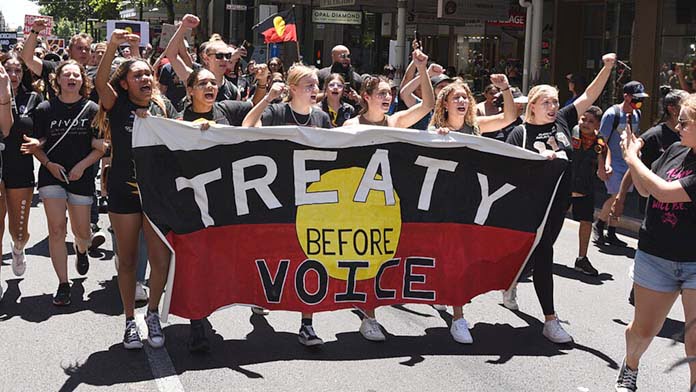Opinion polls indicate that Labor’s Voice to Parliament continues to lose support. August’s Essential poll showed 47 per cent opposed, 43 per cent in favour and 10 per cent uncertain.
No voters outnumbered supporters in all states except Victoria, meaning the referendum requirement for Yes to be carried in a majority of states is also doubtful.
A successful referendum was always going to depend on the strong reservoir of support for Aboriginal rights that exists across society, a sentiment expressed in early polling which suggested upwards of 65 per cent support for the Voice.
The fundamental weakness of the Voice, however, is that it has been designed to appease conservatives who do not support Aboriginal rights.
In the hope of getting the Liberal Party on board, the Voice’s architects proposed a toothless advisory body, subservient to parliament.
But when Dutton chose to oppose the referendum to consolidate the right-wing base of the Liberal Party, Labor’s response has been to chase establishment support by denying that the Voice will do anything substantial.
This has given supporters little reason to fight for the Voice and allowed Dutton’s racist arguments to gain momentum.
Shifting right
The official Yes23 campaign is packed with Liberals and their sympathisers, including Mark Textor, who was a strategist for John Howard. Its approach is feeding support for No.
Increasingly, the campaign is emphasising the importance of “constitutional recognition”, denying there will be any fundamental change in power relations.
Albanese promised shock jock Ben Fordham that any Voice requests to move national celebrations from 26 January would be rejected, while Linda Burney denied the Voice would even have anything to say about Invasion Day.
Albanese and Burney have denied the Voice would talk about climate change policy or the location of military bases, emphasising a focus on Indigenous health, education, housing and employment. What about youth incarceration, on-going child removals, Black deaths in custody or destruction of land by mining companies?
For years, left-wing Voice supporters have promoted the referendum as a step towards a national Treaty process. But Albanese now insists it has “nothing to do” with a Treaty.
Disgracefully, Yes23 campaign director Dean Parkin supported the WA Labor government’s retreat from recent reforms to cultural heritage laws. The new laws were supposed to prevent incidents such as Rio Tinto’s destruction of Juukan Gorge in 2020 from happening again.
But after protests by pastoralists and mining companies, WA Labor decided to scrap the laws, a move Parkin said “gave his side clear air to sell the Voice”.
Rio Tinto joined the recent Garma festival to spruik big business support for the Voice. Big corporations have been happy to promote the Yes vote because it will do nothing to challenge their interests. But for many people struggling with a cost of living crisis, corporate backing only feeds cynicism about the Voice’s purpose.
Also feeding cynicism in the Aboriginal community is Labor’s failure to act on pre-election policy commitments.
Albanese insists the Voice is about jobs, for example, but hasn’t lifted a finger to fund a promised community-based employment program in regions still reeling from the destruction of the CDEP scheme 15 years ago.
Fight for real change
Labor’s lack of real action and constant concessions have boosted the arguments of Indigenous activists standing for a progressive No vote. A number of activists with a history in grassroots protest movements, such as Wayne Wharton, Boe Spearim and Lidia Thorpe, are calling for a No vote.
The main No most people are exposed to, however, is the explicit racism of Dutton. Celeste Liddle, an Indigenous writer and unionist who says she is undecided on the Voice, summed up the anti-Dutton sentiment, saying, “My mistrust for the ALP is surpassed only by an utter loathing of the Coalition and, by extension, far-rightwingers such as One Nation.”
Overwhelmingly, Yes supporters want to see positive change for Indigenous people. Trade unionists have joined the campaign due to traditions of working-class anti-racism and support for Indigenous struggles. Many are worried about momentum behind Dutton and the far-right.
But if the referendum loses, the blame will lie with Albanese. This weak proposal has never been about actually giving power to Indigenous people.
Solidarity will vote Yes in the referendum, but the fight for Indigenous rights is not going to be determined by voting Yes.
The lesson of more than 200 years of resistance, from Pemulwuy to the Pilbara strikes to the Gurindji walk-off and Tent Embassy, from the Black Moratorium in 1972 to the Black Lives Matter demonstrations in 2020, is that struggle has the power to win real change.
To really challenge oppression and win self-determination we have to smash the racist system.
By Ian Rintoul






